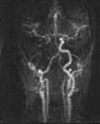Complete occlusion of extracranial internal carotid artery: clinical features, pathophysiology, diagnosis and management
- PMID: 17308211
- PMCID: PMC2805948
- DOI: 10.1136/pgmj.2006.048041
Complete occlusion of extracranial internal carotid artery: clinical features, pathophysiology, diagnosis and management
Abstract
A complete occlusion of the internal carotid artery (ICA) is an important cause of cerebrovascular disease. A never-symptomatic ICA occlusion has a relatively benign course, whereas symptomatic occlusion increases future risk of strokes. Ultrasonography, magnetic resonance imaging and contrast angiography are useful diagnostic tests, and functional imaging of the brain (eg, with positron emission tomography) helps to understand haemodynamic factors involved in the pathophysiology of brain ischaemia. Recently, there has been a resurgence of interest in the role of extracranial-intracranial bypass surgery for the treatment of completely occluded ICA. With advances in the measurement of cerebral haemodynamics, it may be possible to identify high-risk patients who could benefit from the bypass surgery.
Conflict of interest statement
Competing interests: None declared.
References
-
- Yanagihara T, Piepgras D G, Klass D W. Repetitive involuntary movement associated with episodic cerebral ischemia. Ann Neurol 198518244–250. - PubMed
Publication types
MeSH terms
Substances
LinkOut - more resources
Full Text Sources
Miscellaneous



